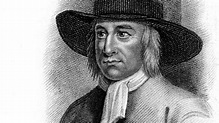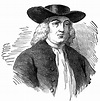Quaker History
I saw also that there was an ocean of darkness and death, but an infinite ocean of light and love, which flowed over the ocean of darkness. - George Fox, 1624-1691
The Religious Society of Friends, also referred to as the Quaker Movement, arose in England in the middle of the seventeenth century. This was a time of turbulence and change in both religion and politics. In the established Church of England, great emphasis was placed upon outward ceremony. In churches such as the Baptists and Presbyterians, religious faith was generally identified with the authority of the Bible or the acceptance of a formal creed. Many individuals, however, became increasingly dissatisfied with ceremonies and creeds and broke away from these churches. Singly or in small groups, they turned inward in search of a religion of personal experience and direct communion with God. They rejected, therefore, the assumption that this communion, which is essential to spiritual health, occurs primarily in the presence of designated persons in an established religious institution using sacred language and rituals.
The Religious Society of Friends was founded in England by George Fox. He and other early Quakers, or Friends, were persecuted for their beliefs, which included the idea that the presence of God exists in every person. Quakers rejected elaborate religious ceremonies, didn’t have official clergy and believed in spiritual equality for men and women. Quaker missionaries first arrived in America in the mid-1650s. Quakers, who practice pacifism, played a key role in both the abolitionist and women’s rights movements.

George Fox
In the 1640s, George Fox, then a young man and the son of a weaver, left his home in the English Midlands and traveled around the country on a spiritual quest. It was a time of religious turmoil in England, with people seeking reform in the Church of England or starting their own competing churches.
Over the course of his journey, as Fox met others searching for a more direct spiritual experience, he came to believe that the presence of God was found within people rather than in churches. He experienced what he referred to as “openings,” instances in which he felt God was talking directly to him.
Quaker Beliefs
Fox shared his religious beliefs and epiphanies with others, speaking to increasingly larger gatherings. Even though his views were viewed by some as a threat to society and he was jailed for blasphemy in 1650, Fox and other early Quakers continued to share their beliefs.
In 1652, he met Margaret Fell, who went on to become another leader in the early Quaker movement. Her home, Swarthmoor Hall in northwest England, served as a gathering place for many of the first Quakers. Fox and Fell married in 1667.
Meanwhile, “Quaker” emerged as a derisive nickname for Fox and others who shared his belief in the biblical passage that people should "tremble at the Word of the Lord." The group eventually embraced the term, although their official name became Religious Society of Friends. Members are referred to as Friends or Quakers.
What Is a Quaker?
Quakerism continued to spread across Britain during the 1650s, and by 1660 there were around 50,000 Quakers, according to some estimates.
A number of Quaker beliefs were considered radical, such as the idea that women and men were spiritual equals, and women could speak out during worship. Quakers didn’t have official ministers or religious rituals. They opted not to use honorific titles such as “Your Lordship” and “My Lady.”
Based on their interpretation of the Bible, Quakers were pacifists and refused to take legal oaths. Central to their beliefs was the idea that everyone had the Light of Christ within them.
Fox spent much of the 1660s behind bars, and by the 1680s thousands of Quakers across the British Isles had suffered decades of whippings, torture and imprisonment.
Colonial Quakers
Quaker missionaries arrived in North America in the mid-1650s. The first was Elizabeth Harris, who visited Virginia and Maryland. By the early 1660s, more than 50 other Quakers had followed Harris.
However, as they moved throughout the colonies, they continued to face persecution in certain places, particularly in Puritan-dominated Massachusetts, where several Quakers - later known as the Boston Martyrs - were executed during the 1650s and 1660s.

William Penn
In 1681, King Charles II gave William Penn, a wealthy English Quaker, a large land grant in America to pay off a debt owed to his family. Penn, who had been jailed multiple times for his Quaker beliefs, went on to found Pennsylvania as a sanctuary for religious freedom and tolerance.
Within just a few years, several thousand Friends had moved to Pennsylvania from Britain.
Quakers were heavily involved in Pennsylvania’s new government and held positions of power in the first half of the 18th century, before deciding their political participation was forcing them to compromise some of their beliefs, including pacifism.
Quakers and Human Rights
The Quakers took up the cause of protecting Native Americans’ rights, creating schools and adoption centers. Relations between the two groups weren't always friendly, however, as many Quakers insisted upon Native American assimilation into Western culture.
Quakers were also early abolitionists. In 1758, Quakers in Philadelphia were ordered to stop buying and selling slaves. By the 1780s, all Quakers were barred from owning slaves.
In the 19th century, many of the leaders of the women’s suffrage movement in the United States were Quakers, including Lucretia Mott and Alice Paul.
* Source: https://www.history.com/topics/immigration/history-of-quakerism
Hubb Manager, 11/29/2019